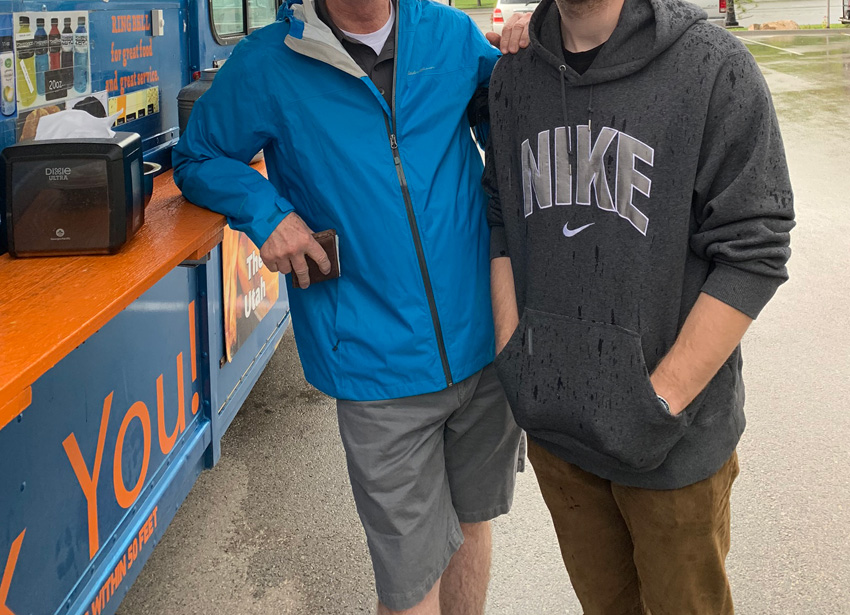I recently went on a family trip and spent a lot of time with my parents—more than I have for a long time! It was great to be with them, but there were some hard things, too.
I realized that we struggle with open communication, especially about issues we find uncomfortable. Because of this realization, I came home from our trip with a new goal: I want them to understand what I’m going through, and also so they can know what I’m thinking about pressing issues.
However, it can seem too hard to initiate a talk like this.
I know I’m not the only one that faces this dilemma. We want our parents to listen to our thoughts about pressing topics like racism, class disparity, addictions, and pornography, but it can often be a challenge to have a productive conversation.
Why it’s important to talk with your parents about porn – and what makes it hard
And why should we talk about pornography, out of all the important issues in the world today? After all, discussing pornography can be, well, awkward. But it can be worth it in many ways.
For instance, starting conversations about pornography with adults can help them realize its influence, and they can become better resources for other people in the long run.
My friend Liz said that her parents avoided the topic because they trusted too much in an “ideal world” and weren’t open to the realities of pornography’s constant presence in our lives. “We don’t live in a rose-colored world,” she said, “but my parents thought we did.” Her parents’ silence forced her to research pornography and addiction on her own, which she found to be a damaging process.
Like Liz’s parents, older adults might not understand the full impact of pornography today, so talking to them about it might help them be more aware about pornography’s effects on society. When they understand, they might be more willing to speak up and help others.
Sometimes even parents struggle with pornography
Initiating conversations about pornography might also allow us to help our parents if they experience pornography-viewing urges themselves.
My friend Carly opened up about her experience with one of her parents, who has a pornography viewing habit, and recounted the hurt, anger, and betrayal she felt when she found out. When she initiates conversations about pornography and tries to help, she finds healing.
“I’ve found my own acceptance and am just focusing on loving. It’s not my responsibility to change my parent, but if they ever decide that they do want to change I’ll be ready to help how I can. They know I am here because I’ve been so open.”
Talking and being available during dark times has helped her heal personally and given her parent a supportive backbone to change.
End the silence, change the culture
Another reason to talk about pornography is to change our current culture of taboo, which is a big focus here at Reach 10.
Another friend I asked commented, “A topic becomes taboo when nothing is said and all is assumed. Assume nothing! Just talk about it.”
In our current climate, pornography is usually ignored as a harmless habit or an embarrassing secret. But when we talk about porn, it becomes more normal to discuss and we can find real solutions to pornography habits and addiction. When we are open in our lives by discussing pornography and other tough issues with our parents and trusted adults, we open up possibilities for growth and healing.

*Caution*
There are better times and places for these conversations. McCall shared a good insight about our reasons behind bringing up difficult topics like pornography.
“I’ve found that we should choose our battles and conversations wisely. If the conversation can lead to positive change in the future, it is productive and worth pursuing. If the conversation will only cause pain and strained relationships by pointing blame or pinpointing unchangeable statements, I believe these can cause more hurt than harm.”
Our conversations are important stepping stones in increasing trust and communication regarding pornography and initiating change. But if our conversations don’t have a positive goal and are simply to shock or guilt our parents, we should find a different outlet instead of a one-on-one talk.
Here are some “Do’s” that can help bridge the gap between silence about pornography to an open area for discussion with our parents and other trusted adults.
1. Do try to see things from our parents’ perspective
One way to bring up difficult issues is to first ask questions to understand our parent’s point of view. We can ask open-ended questions like:
- What did your parents teach you about this?
- Was this a problem when you were growing up?
- When did you realize that _____ is a problem in society?
- What are your thoughts about _____?
- Do you know anyone who has struggled with this?
- What do you think would help solve this problem?
Our questions don’t have to lead to a full-blown discussion right away, but they can help introduce the subject in their mind, especially if they don’t ever bring it up. Once they start thinking about it, they may become more comfortable with the subject, and this can lead to more open conversations in the future.
Asking questions can also tell us more about their opinion or experience with pornography, which can aid us when the time comes for a more formal conversation. The more we know, the more we can empathize, and the more we can bring to the table when we make a time to really focus on the issue.
2. Do have a goal and communicate it clearly before you begin the discussion
A conversation can have many purposes, and is easier to deal with when we honestly and openly share our goals with the other person.
- Am I hoping to increase communication?
- Do I want my parents just to understand what’s going on in the world?
- Do I simply want a listening ear free of advice or preaching?
Tell them! A few things we can say:
“Hey, I need to tell you about something, but I just need a listening ear right now. Can I talk to you sometime? You don’t need to fix anything!”
“There are a few issues in the world that I face that you didn’t really have to worry about when you were growing up. Pornography is a big issue today. I would love to discuss how I feel about it with you.”
When we tell our trusted adult our goal, we are taking control of the conversation and helping them to understand our purpose. We are clear, open, and straightforward, and it helps the other person know what to expect.

3. Do create a good conversation environment
Stepping into our parents’ shoes and stating our purpose is helpful, but a well-planned discussion means nothing if anyone involved is preoccupied. Setting aside a specific time, and ensuring that time is free from distractions, makes it easier to talk.
We can offer to go for a drive, take a walk, or ask when a good time is for the other person. If it’s over the phone, try to plan a time where the other person is comfortable and ready to discuss. We can’t control everything, but we can make sure that the times we choose have the best environment for a meaningful and productive discussion.
4. Do have a strategy for talking to your parents about pornography
It can be daunting to talk about pornography, especially when we feel like we don’t have experience. That’s okay! Our desire to bring about change is important. That being said, it never hurts to be prepared before a delicate conversation.
A few conversation tips and tricks:
The Hamburger Method. McCall had a great tip for difficult conversations. She said, “We can start the conversation out with a bun, something a bit easier to chew on, something conversational and easy to hear, then we work our way to the meat (the reason for the conversation). This is tougher to chew, and more intense, but it’s the most important part. Then we end with a bun or something a bit easier to swallow again. End on a positive note. It makes the conversation feel more manageable and productive.”
Write down our idea or a plan and practice with a friend or sibling. This can help us prepare for different reactions, and also help us keep our emotions in check as we practice.
There are lots of great resources on the web about how to discuss with openness and other strategies for difficult conversations (This webpage from Fight the New Drug is specifically focused on pornography, and this article offers good tips for how to prepare for difficult conversations)
5. Do talk with love and understanding
No matter how important we feel a matter is and no matter how well we prepare, people may respond in ways we didn’t anticipate.
They may be extremely honest and tell us things we weren’t expecting to hear, or they could be unwilling to discuss the issue further. No matter their reaction, we can control our own responses.
Carly shared a lesson she’s learned in vulnerable conversations about pornography.
“Staying calm and respectful has and always will be my biggest weakness in communication … Know what you need to express for your own mental health, but keep it calm and loving. There are so many deep emotions involved [in discussions about pornography]. If those emotions are released all at once it can be toxic and explosive. So staying calm is vital!”
Like Carly said, keeping our emotions in check and showing respect shows maturity and love. Even if our parent refuses to discuss or reacts negatively, our reaction shows that we care and just want to do what we think is right. If our trusted adult refuses to discuss an issue with us, recognize that there are many reasons for this, and we can try to see the issue in their eyes (see “Do” #1).
If we really do need to talk, but they are unwilling, and be patient. Look for other mentors who are more willing to be open with you, and keep doing your best to respect and honor those who may not be ready yet for such open conversations.
It isn’t easy to talk about pornography, especially to mentors or parents. But in the long-run, creating space and time for quality conversations can help you and your loved ones grow and learn together. As we connect and reach out to others, including our own parents, we can help fight pornography and its addicting influences, and help them understand how to reach out, too. When we open our hearts and allow for positive dialogue, we can help others love.









1 comment
Hey Casey! How did you get to be so insightful? I believe you make some excellent points and give helpful advice to start dialogue. Your honesty and courage is uplifting! Rosa Eaton